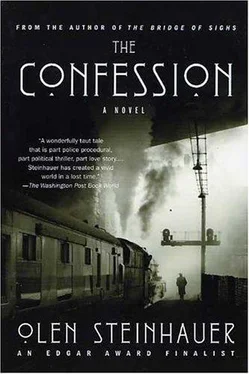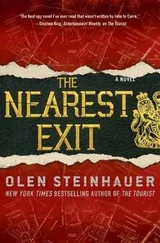Olen Steinhauer - The confession
Здесь есть возможность читать онлайн «Olen Steinhauer - The confession» весь текст электронной книги совершенно бесплатно (целиком полную версию без сокращений). В некоторых случаях можно слушать аудио, скачать через торрент в формате fb2 и присутствует краткое содержание. Жанр: Политический детектив, на английском языке. Описание произведения, (предисловие) а так же отзывы посетителей доступны на портале библиотеки ЛибКат.
- Название:The confession
- Автор:
- Жанр:
- Год:неизвестен
- ISBN:нет данных
- Рейтинг книги:5 / 5. Голосов: 1
-
Избранное:Добавить в избранное
- Отзывы:
-
Ваша оценка:
- 100
- 1
- 2
- 3
- 4
- 5
The confession: краткое содержание, описание и аннотация
Предлагаем к чтению аннотацию, описание, краткое содержание или предисловие (зависит от того, что написал сам автор книги «The confession»). Если вы не нашли необходимую информацию о книге — напишите в комментариях, мы постараемся отыскать её.
The confession — читать онлайн бесплатно полную книгу (весь текст) целиком
Ниже представлен текст книги, разбитый по страницам. Система сохранения места последней прочитанной страницы, позволяет с удобством читать онлайн бесплатно книгу «The confession», без необходимости каждый раз заново искать на чём Вы остановились. Поставьте закладку, и сможете в любой момент перейти на страницу, на которой закончили чтение.
Интервал:
Закладка:
Olen Steinhauer
The confession
You assemble the picture later, after all the bodies have been examined and the clues tracked down and all the facts have come to light. Or most of them. Or some.
It is 1956. The Comrade Chairman has been dead three years, and General Secretary Mihai has less than a year left to him. No one knows this yet, but Mihai knows. Maybe this knowledge shadows every decision he makes.
The year feels light after all those others, and once news of the Twentieth Congress in Moscow spreads, the pictures of Stalin disappear from the bookstores and post offices and living rooms. Soon, it’s hard to find the old man anywhere in the Capital. Where his volumes of speeches were once shelved, there is now a stack of crisp little pamphlets by N. Khrushchev. Stalin chose the path of repression and physical annihilation, not only against actual enemies, but also against individuals who had not committed any crimes against the Party and the Soviet government.
You hear about Budapest on the radio-the Magyars are setting fire to Comrade Chairman Stalin’s posters. They make a show of dancing in the ashes, in the middle of the street. The Hungarians are a surprisingly vocal lot.
The Poles have also made noises and faced tanks on what they call Black Thursday, setting off a ripple of discontent through their own young nation.
But at home it’s a good time. Some of the old writers return to the shelves, and you’re surprised, even, by what you read. In The Spark’ s editorial pages, citizens complain about hot water and trash disposal and crime. Their anger sweetens the air, and this irony is intoxicating. After war and the era of the Comrade Chairman, it feels like we’re finally finding our own path. You hear it in the radio speeches, in the promises from Mihai’s own lips, and from others in the political stratosphere. There’s the old history professor, Bobu, and Kozak the Engineer who rants about the “thick Muscovites” in the Central Committee and demands a new, national path to socialism. Mihai gives up his First Secretary post and keeps only his Prime Ministership-a reminder of the progress to collective leadership. Truly, says an editorial, the Dictatorship of the Proletariat has never been so democratic.
All this is just background to the hope. Certainly now it seems naive and unwarranted, but it was there. For a few months. Years may pass, but the memory of that hope always warms you. Future generations will not understand, but you would want to make the historic moment clear. Not for individual glory, nor opportunism. Only clarity.
Resolution 683 was first suggested by Mihai at the Fifth Party Congress of the Central Committee. 25 July, five months to the day after Comrade First Secretary Khrushchev’s words to his own secret Congress, and two months after the Yugoslavs spilled the secret to the rest of us. Mihai announced with grave urgency his agreement with the First Secretary. Stalin’s crimes. Stalin’s mass terrors. Stalin’s insidious effect on the development of socialism in this eastern edge of Europe.
In the newsreels Mihai purses his lips between thoughts, hands gripping each side of the podium, over the profile of a hawk surrounded by laurel. These pauses are heavy with meaning, and you want to think this signifies that his words are heavy with meaning, that this is a man convinced of the truth of his own words. But again, with all that follows, you wonder.
He proposes to right the wrongs of the Comrade Chairman. From 1945 to 1953, he explains, hundreds-no, thousands- in our own dear land were wrongly jailed in tiny municipal prisons, in medieval dungeons, in the labor camps of the western provinces. Under the express urging of the Comrade Chairman.
No one in the Committee chambers is hearing anything new. No one in the entire country. It’s the telling, the act of speaking aloud, that is new. The Central Committee chamber-all 236 men and women-is silent. Mihai’s dark hair is mostly white; he’s not the young partisan he once was. He sighs significantly and tells the chamber that he proposes to release all political prisoners, effective immediately.
There is a polite pause. The room waits for a but, or a however.
The room erupts. Thunderous applause. A few stunned Committee members, unsure, lag behind. Maybe they’re wondering where they will be in this new world of prisoners in the streets. But then they’re swept up in the wave of clapping hands. The domed ceiling rolls their applause back down at them, and that only heightens their fever; the noise rises. Deafening. They’re on their feet, stomping, clapping, shouting unintelligibly. And under this onslaught of approving mayhem, Mihai folds his speech in half, creases the edge, and slips it into a jacket pocket. In the newsreel, you can see the fatigue. Wrinkles clear under the harsh lights, eyes weathered and sagging. Maybe he knows everything. All that will follow. The applause lasts a full seven minutes. There are wet eyes-yes, even tears. The Amnesty has begun.
Summer
1
Packing up the dacha was a simple, silent affair. Three weeks’ worth of clothes, damp underwear still hanging from the back porch, pens and paper, and all the books. I saw Flaubert and Dostoyevsky to the skoda’s trunk, then wedged my own novel beside them. The creased, sewage-colored paperback was a vainglory I still felt I could afford.
Stories begin this way, with the mundane details. Underwear, books, leaves. Because these are the irrefutable facts; they exist outside speculation. I’m in that dacha now, verifying everything, because while other points in time may be chosen, this is where my confession truly begins.
Then there were the empty brandy bottles, clanking on their way to the car, two full boxes. Magda had helped out that first week, when the conversation sank into mute glances and nods, pouring whenever our glasses were low. But after she walked out I had two weeks to tackle the bottles alone: a big, hulking thirty-seven-year-old drinking brandy from tiny glasses, spending the days in front of blank sheets of paper at the table that looked out onto the dried forest, thinking only that, yes, my wife has finally left me.
And each morning I woke with a stunned head and a pile of still-empty pages.
Once everything was collected I made the slow walk through the bedroom, living room, kitchen. I even looked in the fly-infested out-house to be sure nothing was left behind. Methodical. This was the only way not to imagine her in the shadows and ignore the long walnut hairs left on the sofa. The kitchen stank of old, spilled liquor and the occasional gusts of forest decay through the open windows.
Locked the shutters, then the doors. No extended pause on the front steps, no reflections while looking back on her family’s dacha, nervously adjusting my rings.
It took a half hour to reach the main road, then I turned south, where the trees thinned into farmland and fields, and the sun caught on the dirty windshield. I tried in vain to dampen my mouth. Behind a detour, the road was torn apart, and an old woman poured a kettle of steaming tar into a hole while other women with kerchiefs on their heads leaned on shovels and watched. The Skoda’s engine sputtered when I went too fast, and I remembered Georgi’s comment when I’d first bought the car. He had walked around it slowly, a hand on his chin, then said: I do believe that very soon socialist engineering will accomplish the dream of fitting an automobile into a shoe box.
2
Her parents’ modest farmhouse looked exactly as it had when I first saw it-1935, October. I can mark only a few things in time. Magda was a lithe schoolgirl who spent the days in class being ogled by my best friend Stefan and me, and after some unbearable amount of time, I was the lucky one invited to her house for lunch on a Friday afternoon. Sixteen years old, and I was already hers. Storm clouds had overrun the sky then, like now. A warm wind rolled over the orchard-covered hills.
Читать дальшеИнтервал:
Закладка:
Похожие книги на «The confession»
Представляем Вашему вниманию похожие книги на «The confession» списком для выбора. Мы отобрали схожую по названию и смыслу литературу в надежде предоставить читателям больше вариантов отыскать новые, интересные, ещё непрочитанные произведения.
Обсуждение, отзывы о книге «The confession» и просто собственные мнения читателей. Оставьте ваши комментарии, напишите, что Вы думаете о произведении, его смысле или главных героях. Укажите что конкретно понравилось, а что нет, и почему Вы так считаете.












